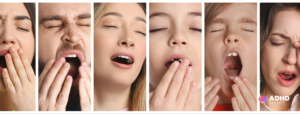Most people with ADHD know exactly what it feels like when their brain just won’t switch off at night. If you’ve found yourself wide awake at 2 a.m., replaying the day or endlessly scrolling, you’re not alone. Many describe this as a hyperactive or overactive brain at night, where thoughts keep going even when the body feels tired. Sleep problems are a daily challenge for many leading to groggy mornings, fading focus, and real frustration.
According to the University of Southampton study on ADHD and insomnia, around one in four adults with ADHD report chronic insomnia or ongoing sleep disturbance, highlighting a much higher rate than in the general population. This helps explain why so many people with ADHD struggle to sleep, especially in adulthood.
In short, ADHD and insomnia are closely linked. Sleep difficulties in ADHD are commonly caused by delayed sleep cycles, dopamine imbalance, stress, and overstimulation.
This article covers why ADHD can cause insomnia, how poor sleep affects focus and which practical strategies can help.
Next, let’s look at how ADHD affects the body’s sleep-wake system.
Why do people with ADHD struggle to sleep?
To understand why insomnia is so common in ADHD, it helps to look at how the brain’s sleep–wake system, stress response, and emotional regulation work together.
The ADHD Sleep–Wake Cycle
People with ADHD often experience a delayed sleep phase disorder, meaning they naturally feel more alert late at night and struggle to fall asleep at conventional hours. Many people describe this as having an ADHD sleep cycle that feels shifted later than everyone else’s, where falling asleep before midnight can feel almost impossible.
This pattern reflects the ADHD brain’s tendency to stay active when most people are winding down, which helps explain why people with ADHD struggle to sleep and often wonder why they cannot fall asleep until 2 a.m. The result is a body clock that becomes misaligned with daily schedules.
Dopamine, a neurotransmitter central to focus and motivation, also influences sleep regulation. When dopamine levels are inconsistent, the signals that cue the brain to rest may be disrupted, leading to brain hyperactivity at night and difficulty switching off.
Neurotransmitters and Stimulation
A 2024 review in Frontiers in Psychiatry highlights that ADHD involves altered dopaminergic and noradrenergic signaling in key frontostriatal and cerebellar circuits responsible for attention, reward processing, and arousal regulation. Rather than a simple dopamine deficiency, ADHD appears to reflect imbalanced catecholamine transmission that disrupts both cognitive control and the regulation of alertness. This dysregulation can sustain neural arousal and mental activity into the evening, contributing to sleep–onset delays, racing thoughts, and restlessness when winding down.
Stress, Overstimulation and Overthinking
The NHS explains that stress and anxiety are leading causes of insomnia, often making it harder for the mind and body to relax before bed (NHS – causes of insomnia). For some people, this can develop into stress induced insomnia, where ongoing mental pressure keeps the brain alert at night.
These factors can be especially intense for people with ADHD, where emotional regulation challenges, sensory overstimulation, and racing thoughts can heighten nighttime restlessness. This combination often keeps the mind in a state of overactivity, delaying sleep and reinforcing the ADHD and insomnia cycle.
How ADHD-Related Insomnia Feels Different
Many people with ADHD describe their sleep difficulties as feeling different from typical insomnia. Instead of feeling physically ready for rest, the body may feel tired while the mind stays unusually alert. This experience is often described as feeling tired but wired.
A common feature of ADHD-related insomnia is mental hyperactivity at night. Thoughts may race, replay conversations, or move quickly from one idea to another. Some people notice their brain becomes more active late in the evening, even if they have struggled with focus or energy earlier in the day, making it hard to fall asleep.
Timing also plays a role. People with ADHD often report not feeling sleepy until very late at night, which can lead to staying awake unintentionally and struggling to wake up the next morning. Over time, this pattern can make it feel as though the body clock is out of sync with daily routines.
These patterns can lead people to question whether insomnia is part of ADHD. While sleep problems alone are not a diagnostic feature, they are very common in people with ADHD and closely linked to how the ADHD brain regulates attention, stimulation, and rest.
The Vicious Cycle: How Poor Sleep Feeds ADHD Symptoms
When people with ADHD do not get enough sleep, the effects show up quickly. UK research has shown that up to 75% of adults with ADHD experience sleep problems, and that deprivation can be as impairing as other core symptoms, such as inattention or impulsivity (Berkshire Healthcare NHS Foundation Trust – ADHD and Sleep).
Many people describe feeling constantly tired during the day, struggling to stay alert or feeling exhausted but still unable to sleep properly at night. NHS backed research shows that helping children with ADHD improve their sleep can enhance concentration, behaviour and mood regulation (University Hospital Southampton – ADHD sleep study).
Poor sleep reduces focus, increases irritability, and worsens impulse control, creating what clinicians describe as an ADHD–insomnia feedback loop. The resulting fatigue and emotional strain often lead to burnout, a state of exhaustion, low motivation, and declining daily productivity.
Understanding and addressing this cycle is key to managing ADHD symptoms more effectively and improving long term wellbeing.
Triggers and Contributors to Insomnia in ADHD
Insomnia in ADHD rarely has a single cause. It usually develops from a mix of behavioural patterns, medication effects, and other sleep‑related conditions that interact with each other.
Behavioural Factors
People with ADHD often stay mentally active long after bedtime.
The combination of restlessness, racing thoughts, and time blindness can make it easy to lose track of the hours and delay sleep.
NHS and UK health guidance note that excessive evening screen use and overstimulating activities such as social media or gaming can interfere with melatonin release, keeping the brain alert when it should be winding down (NHS – Sleep support).
The dopamine seeking nature of ADHD contributes to this pattern, as screens and digital media provide rewarding stimulation that is difficult to switch off at night.
Signs to watch: Difficulty recognising when tired, staying up unintentionally late, and needing screens to relax before bed.
When to talk to a clinician: If these patterns continue for several weeks or cause persistent daytime fatigue, a clinician or ADHD specialist can help assess contributing factors and structure a plan for better sleep habits.
Medication Effects
Certain stimulant medications can delay sleep onset if taken too late in the day. The NICE Clinical Knowledge Summary on insomnia notes that medical professionals may review medication timing or suggest nonstimulant alternatives when sleep disruption persists (Midlands and Lancashire CSU – NICE CKS: Insomnia).
Adjusting dose timing can help align alertness with daytime hours while allowing the body to rest at night.
Signs to watch: Trouble falling asleep soon after an evening dose, frequent awakenings, or feeling wired late at night.
When to talk to a clinician: Always consult a prescriber before changing doses or schedules, especially when insomnia develops after medication adjustments.
Coexisting Sleep Disorders
Insomnia in ADHD can overlap with other conditions such as restless legs syndrome, obstructive sleep apnoea, or delayed sleep phase disorder.
These may worsen tiredness and concentration problems even further.
NHS publications emphasise that addressing these coexisting disorders often improves both ADHD management and overall quality of life (NHS Scotland – Sleep Problems).
Signs to watch: Snoring, gasping during sleep, intense leg discomfort, or feeling unrefreshed despite adequate sleep duration.
When to talk to a clinician: Persistent or severe symptoms should be discussed with a GP or sleep specialist who can recommend appropriate testing or behavioural therapy options.
When Sleep Problems Cross a Line
Occasional poor sleep is common, but ongoing sleep disruption can have a wider impact on focus, mood, and daily functioning. This can be especially challenging for people with ADHD, where sleep and attention are closely connected.
Sleep problems may become more significant when difficulty falling asleep or staying asleep happens several nights each week, continues for weeks or months, or begins to affect daytime life. This may include constant tiredness, reduced focus, or feeling exhausted despite spending enough time in bed.
Many people with ADHD also notice difficulty waking in the morning or feeling mentally foggy for long periods after getting up. Over time, poor sleep can worsen concentration and emotional regulation, creating a cycle that is hard to break.
If sleep problems are persistent or affecting daily life, it may be helpful to seek professional advice. A structured review can help identify patterns and guide appropriate support.
Strategies That Actually Help
Improving sleep in ADHD doesn’t require dramatic changes.
With steady routines, calming practices, and guidance grounded in NHS supported approaches, it’s possible to restore balance and restfulness.
Retraining the Sleep-Wake Cycle
Keeping a consistent bedtime and wakeup time, including weekends, helps reset the circadian rhythm. Gradual adjustments of 15–30 minutes are recommended to shift sleep schedules safely (TEWV NHS – ADHD and Sleep).
Why it helps: Regular timing stabilises the body clock, making it easier to fall asleep and maintain focus during the day.
Sleep Hygiene Essentials
The Berkshire Healthcare NHS Foundation Trust highlights simple, nonmedical steps for improving sleep quality, such as maintaining a dark and cool bedroom, using the bed only for sleep, and limiting caffeine intake after midday (Berkshire Healthcare NHS – ADHD and Sleep).
Avoiding screens one hour before bed can also prevent dopamine stimulation and blue light interference with melatonin production.
Why it helps: A calm environment reduces alertness and supports the natural release of sleep hormones.
Relaxation and Mindfulness for ADHD Sleep
Cognitive behavioural therapy for insomnia (CBTI) has strong NHS evidence as an effective psychological approach to overcoming chronic sleep difficulties (NHS Sussex – Sleep Support).
Techniques such as mindful breathing, journaling, and gentle reading help the overstimulated ADHD mind shift into a restful state. Listening to calming audio or using guided relaxation can also ease racing thoughts.
Why it helps: Relaxation lowers pre-sleep arousal and creates new associations between bedtime and calmness.
Medication and Supplement Considerations
The NICE CKS on Insomnia advises that melatonin may be considered under medical supervision, particularly for children or adults with confirmed circadian rhythm delay (Midlands and Lancashire CSU – NICE CKS: Insomnia). Treatment should always be discussed with a qualified professional; self-medicating can result in timing or dosage issues that worsen symptoms.
Why it helps: Clinically guided use ensures sleep aids support rather than disrupt the ADHD body clock.
ADHD Friendly Bedtime Routines
Simple behavioural anchors make bedtime more predictable. Setting phone reminders, reducing light exposure an hour before sleep, and doing a brief grounding exercise or gentle stretch can cue the body for rest.
UK based mental health services recommend using relaxing podcasts or low stimulus background sounds for those who find silence overstimulating (Nottingham and Nottinghamshire NHS – Sleeping Well with Autism and ADHD).
Why it helps: Structured routines create consistency and calm the ADHD brain’s tendency to remain active at night, promoting both better sleep and next-day focus.
When to Seek Professional Support
If sleep disturbance persists for more than three nights a week and lasts longer than three months, it may be time to seek professional support. Ongoing insomnia can signal an underlying condition or indicate that medication timing, anxiety, or other health factors are interfering with rest.
The NICE Clinical Knowledge Summary on insomnia recommends starting with a GP evaluation, who can assess causes and refer for further support if needed (Midlands and Lancashire CSU – NICE CKS: Insomnia).
Depending on the situation, people may be referred to a sleep specialist, a mental health professional for cognitive behavioural therapy or an ADHD clinician to review current treatment plans.
Many NHS services now integrate sleep reviews into ADHD care pathways, recognising how closely poor rest and focus difficulties are linked. Reaching out for guidance is a positive, proactive step toward better rest and improved daily wellbeing.
Conclusion
ADHD related insomnia is not about poor discipline or bad habits but a recognised neurobiological response that affects sleep patterns and focus. Understanding this link helps explain why so many people with ADHD struggle to wind down at night and why small, consistent changes make a difference. With time, routines like winding down early, dimming screens, and practising mindfulness can improve rest, energy, and daily performance.
If sleep remains a struggle, a structured clinical assessment can reveal whether ADHD symptoms or other factors are interfering with rest.
Our Adult ADHD Assessment and Children’s ADHD Assessment services provide clear diagnoses and evidence-based treatment planning, including guidance on managing sleep difficulties.
Better sleep for ADHD focus starts with understanding your patterns, seeking support, and trying one small strategy tonight.
Frequently Asked Questions
Does ADHD cause insomnia?
ADHD does not directly cause insomnia in everyone, but sleep problems are very common in people with ADHD. Differences in how the ADHD brain regulates attention, stimulation and the sleep wake cycle can make it harder to fall asleep, stay asleep, or feel rested. This is why ADHD and insomnia often occur together.
Is insomnia part of ADHD?
Insomnia is not a diagnostic feature of ADHD, but it is closely linked. Many people with ADHD experience ongoing sleep difficulties, especially delayed sleep timing and an overactive mind at night. Poor sleep can also make ADHD symptoms more noticeable during the day.
Do people with ADHD struggle to sleep?
Yes, many people with ADHD report difficulty falling asleep, staying asleep, or waking up feeling refreshed. These struggles are common in both adults and children and are often related to brain hyperactivity, stress, and difficulty switching off at night.
Is struggling to sleep a sign of ADHD?
Struggling to sleep on its own does not mean someone has ADHD. However, when sleep problems occur alongside long-term difficulties with attention, impulsivity, or emotional regulation, they may be part of a broader ADHD pattern. A professional assessment can help clarify this.
When should someone with ADHD seek support for sleep problems?
If sleep difficulties occur on more than three nights per week for longer than three months, or begin to cause ongoing daytime fatigue, poor concentration, or difficulty functioning, it is recommended to consult a GP or qualified healthcare professional for assessment and appropriate guidance.
Can ADHD medication cause insomnia?
Yes, stimulant medications can delay sleep if taken late in the day. NHS clinicians often adjust dosage timing or switch to nonstimulants to reduce these effects while maintaining control of ADHD symptoms.

Adam Carter
Author
Adam Carter is a neurodiversity advocate and experienced content writer for ADHD Certify. With a professional background in education and over a decade of personal experience living with ADHD, Adam writes with deep empathy and insight. He is passionate about creating content that resonates with others on similar journeys, offering clarity, encouragement, and hope. In his spare time, Adam enjoys cycling, gardening, and experimenting with new recipes in the kitchen.
All qualifications and professional experience mentioned above are genuine and verified by our editorial team. To respect the author's privacy, a pseudonym and image likeness are used.




